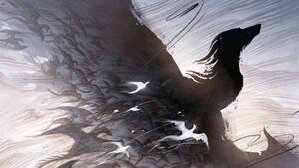Is there any idea more escapist than time travel? Time travel adventures unwind the two cruelest certainties of existence: the irretrievability of the past, and the inevitability of an end to come. As we saw last month in our look at classic time travel stories, so many of these adventures revolve around the correction of historical wrongs, or a salvation of a devastated future. Depending on how optimistic the story is, we get either the triumph or tragedy of the individual will against fate and determinism. The hero either finds she can cheat fate after all, or that the house always wins. Whatever the outcome, there’s the fantasy of getting to try.
In Kelly Robson’s novella Gods, Monsters, & the Lucky Peach, released by Tor.com this week, the time travel physics seem, at first glance, to frustrate this fantasy. When travelers go back in time, a new parallel timeline splits off from the main; but once the travelers return to the future, the alternate timeline collapses and the travelers return to an unchanged world. So, at least, say the physicists at TERN, the corporate conglomerate that controls the technology. On the plus side, you can step on butterflies worry-free. On the other hand, it means there’s no way to save Earth from the environmental catastrophes that drove humanity underground, from the “hells” that are barely starting to emerge.
Minh, a venerable ecologist with six tentacles and an attitude, is one of those surface pioneers, trying to make self-sustaining surface habitats a reality through restoration projects. But TERN’s discovery of time travel diverted funding from the hard, steady work of restoration to the hope of an easy fix in the past. But Minh secures a TERN-sponsored project to send a team back in time to study the Tigris and Euphrates river systems in their prehistoric state, as a baseline for future ecological rehabilitation. It’s a terrific, fresh take on time travel, both in-story and as a matter of genre, and it only gets more sophisticated, once we move past the ins and outs of grant-writing into—well, the past.
Minh and her TERN escort, security specialist Fabian, find the Euphrates not quite as Edenic as hoped, but supports a quarter of a million Sumerians in Ur:
“These numbers must be wrong,” she said.
“The estimate will get a lot higher,” he said. “Are you sure those rivers aren’t polluted?”
A chill ran down Minh’s spine. With such a huge population, they must be.
“I’d have to sample to be sure.”
“Past population members dump everything into the rivers, you know. Sewage, corpses, effluent from tanning and dying. Those industries are toxic.”
Minh didn’t answer. She didn’t want to know.
From hereon, Robson spins a canny allegory that positions TERN’s time travel closely alongside the human irresponsibility that caused Earth’s devastation. When the Sumerians chase the team (and, fair, future humans do look like monsters), Fabian dispatches the past warriors swiftly and without remorse: after all, once the team leaves, the timeline in which they die will collapse, and they’ll be back alive in the prime timeline. Presumably, this unwinds the moral quandary of killing them in the first place. Doesn’t it? In fact, anyone the team (except Fabian) is disposable—if one dies, he can retrieve a very near spare from the recent past.
Kelly Robson (Photo credit: Maxwell Ander)
Time is the new river, and alternate timelines are the waste TERN dumps in it. We all know the story of how waste dumping, disposable commodities, and “externalities” lead to environmental destruction. It’s painfully familiar. Robson’s insight is to connect those attitudes to time travel adventures themselves, as a unified fantasy of escaping consequences. Since Eden, since Ur, we’ve always nursed different versions of this fantasy, whether its rivers carrying effluent to the sea or tech that lets us save ourselves in time. We always know better, and the climax of Minh’s survey drives home the painful cost of being on the disposable end.
Robson loves rivers, that’s clear—Minh’s deep and scientific love for river ecologies drives some of the most exciting, vivid writing in the novella, and it’s infectious. Escapism isn’t a dirty word in my lexicon, but hopefully we keep getting books like Lucky Peach, that balance out fantasy with the long, uncertain, but rewarding work to fix our world.












Cadwell Turnbull's new novel — the first in a trilogy — imagines the hard, uncertain work of a fantastical justice.